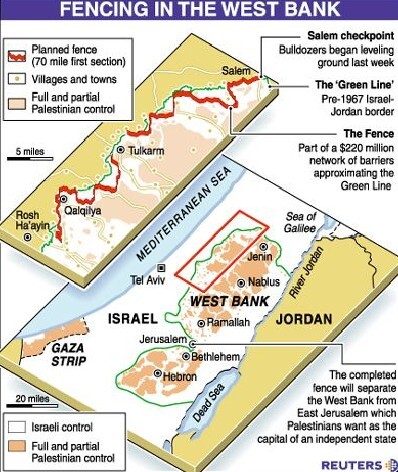The Electronic Intifada 29 August 2002
On June 17, CNN reported: ‘Israel broke ground Sunday on a 217-mile-long fence along its border with the West Bank, angering Palestinians and some Israelis’. Jerrold Kessel said:

‘The groundbreaking work began formally [Sunday] in the northern part of the West Bank and Israel along that frontier for this fence, which will be built roughly along the Israel-West Bank border’.
However, the fence is not built on the demarcation line, also known as the ‘Green Line’ but is built on confiscated Palestinian land, separates Palestinian communities, denies access to land to farmers, breaks off water lines, and de facto illegally annexes more land and water resources for Israeli consumption.
The land needed to build this ‘fence’, which in fact is a wall, is confiscated by the Israeli army through three military orders: 17/2002/T, 20/2002/T, 22/2002/T, which were issued by Israel’s military commander of the Westbank, Moshe Kaplinski. The military orders state that the Israeli army will ‘cease’ (confiscate) these lands until December 31, 2005. As can be seen on the video the wall seems to be permanent. Moreover, settlements which are located on the eastern border of the ‘Green Line’, inside the occupied Palestinian territories, will be annexed to Israel. A great number of these settlements were developed by Ariel Sharon, who was Israel’s Housing Minister in 1990.
Israel already allocated funds and presented a time line for finishing construction. This means that the Israeli government did not leave room for either compensation of confiscated Palestinian land, property and resources, but does also not give room for filing legal remedies.
The military orders and the construction of the wall violates basic principles of international (humanitarian) law. The Hague Regulations prohibit the occupying power to undertake permanent changes in the occupied area, unless these are due to military needs in the narrow sense of the term, or unless they are undertaken for the benefit of the local population.
In Tulkarem, the wall will cut down agricultural land and green areas, used by Palestinian farmers. The second video shows the map of the wall in the area of Tulkarem, separating Palestinian communities, cutting down agricultural land and denying access of Palestinian farmers to their land. At the end of the video, we filmed from the roof of a home which will be separated from Tulkarem and will be located between the ‘Green Line’, the 1967 demarcation line, and Tulkarem. The family who lives there is originally from a home, which could be seen from the roof, which is located on the other side of the ‘Green Line’. In 1948, the father of the owner headed to Tulkarem and his brother stayed. Now, he will be completely isolated from both his family in Tulkarem and his uncle’s family, who live in Israel.
Some Israeli security officers even question the wisdom of the ‘fence’. In an interview with the Israeli daily Ha’aretz, published in its Friday Magazine of August 30, IDF Chief of Staff Moshe Ya’alon, said: ‘I don’t think the fence will solve all the problems’, adding ‘if I were given that money, I would invest it elsewhere.’
The problematic coverage on the wall includes the inaccuracy that the wall is not build on the ‘Green Line’ but inside the occupied Palestinian territories. Some Israeli settlements build on confiscated and occupied Palestinian lands are now de facto annexed to Israel. The wall will separate Palestinian communities living between the ‘Green Line’ and the wall, Palestinian farmers are deprived of their land and property and will be denied access to their land and livelihood.
Israel started preparations for the construction of its apartheid wall on June 16, 2002, near the village Salem, west of Jenin, towards the north, reaching Tulkarem. Israeli officials have stated that the wall will be finished by the end of this year. The wall will separate fourteen villages and isolate them from their agricultural lands. The barrier will be 115 kilometres (70 miles) long, it will include fences, trenches and security patrols. And this is only the first phase, eventually it is meant to extend the full 350-km (220 mile) length of the West Bank.

UPDATE: New Israeli map highlights Palestinian concerns about “security fence”
Related Links




